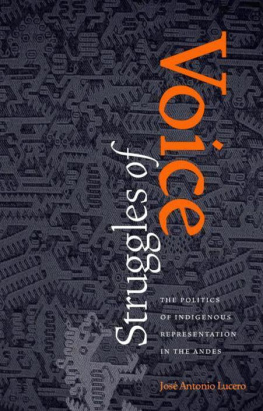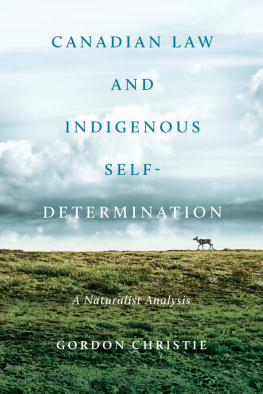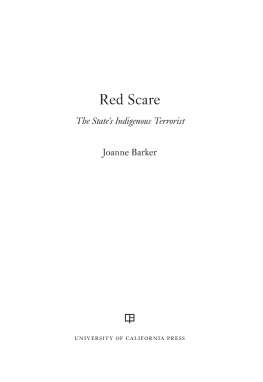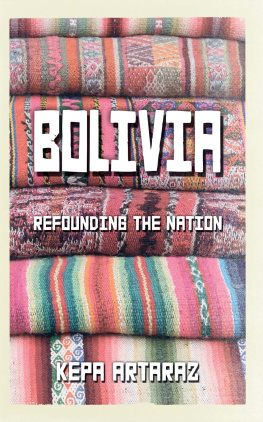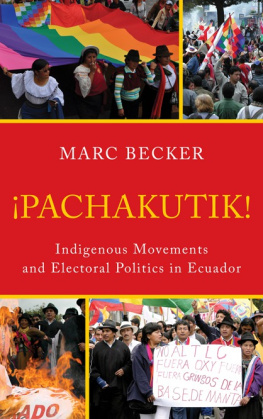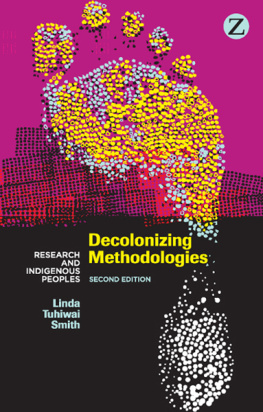


REPRESENTATION
IN THE ANDES
Jose Antonio Lucero
UNIVERSITY OF
PITTSBURGH PRESS




vii
xiii
xv

This book was completed as Evo Morales celebrated the oneyear anniversary of the historic landslide victory that made him the first indigenous Bolivian to be elected president in his indigenous-majority country. Meanwhile, in Ecuador, Luis Macas, the best known indigenous movement leader in that country, also ran for president but with much less success than Morales: Macas lost badly in the first round of voting, winning just over 2 percent of the vote. In some ways, these outcomes are remarkable, as they signal reversals of fortune for indigenous movements in each country. In the 199os, Bolivian movements were fragmented (if always formidable) and faced a series of neoliberal governments that pushed through a mix of structural adjustment and multicultural reforms despite indigenous opposition. The same decade saw a strong and united Ecuadorian indigenous movement constantly thwarting neoliberal policies and gaining important policy-making spaces within the Ecuadorian state. Since zooo, however, the situation has changed dramatically, as the contrasting campaigns of Morales and Macas suggest. This book attempts to shed some light on both the highs and lows of indigenous movement politics in these countries by examining how movements come together culturally and politically, and how they come apart.
Most of the final revisions of this book were completed as my companera Maria Elena Garcia and I were in Andalusia, Spain, perhaps an ironic place to finish a book on the political rise of a people whose "fall" many date back to the Spanish encounter of 1492. That year, of course, was doubly tragic, as it marked not only the beginning of Conquest in the New World but also the culmination of the Re-Conquest, the expulsion of Muslims and Jews from the (Old) Iberian world. For the case of Andalusia, as Maria Rosa Menocal (2002) and others have chronicled, 1492 marked the passing of a surprisingly tolerant medieval world in which the people of the book (Jews, Christians, and Muslims) borrowed and stole from each other in building a world where they could all live peacefully (with some unfortunate exceptions). Over the centuries, though, the flexible "first-rate societies" of Al-Andalus were slowly destroyed by currents of fundamentalism, authoritarianism, and war.' The last broken promise of the Catholic Kings-religious freedom for Muslims offered in one breath and taken back in the next-is described by Menocal as the failure to make the hard choice to stand against these currents, thus ushering in a modern age in which singularity, homogeneity, and sharp boundaries replaced the medieval mosaic of contradiction, multivocality, and flexible frontiers. Thus the double tragedy of 1492: the last sighs of Andalusian tolerance serve as prelude to the battle cries of Conquest in America.
And yet Menocal suggests that all is not lost, that these Iberian echoes can still be instructive, that those first-rate pasts remain valuable and available to us, even in their broken forms. Though the bombing of Sarajevo's library in 1992, five hundred years after the destruction of Arabic libraries throughout Andalusia, the start of a U.S.-led "war on terror," and rising anti-immigrant sentiments throughout the world provide little opportunity for this hopeful past to be discussed in the news, they do make its rescue all the more urgent.
For me, the Andes is one place where these Andalusian echoes resonate. In the debates over plurinationality and in the marches of indigenous and campesino struggles, one finds these old ideas of tolerance in new form. Contemporary critics say that this is one more parody of multiculturalism, lip service to cultural diversity during times when economic crisis is the more proximate cause of social troubles. These objections have merit, but they also suffer from the myopia of a cynicism that keeps us from seeing the lesson of Menocal's Andalusian tale: it is in the traffic of ideas, libraries, and languages that democratic possibilities take form. The aptly named "people of the book" found in their books and libraries (often in the lingua franca of Arabic) the common ground that made possible a certain form of intercultural society that did not need to flatten out the incongruities and contradictions of difference. Do Kichwas, Aymaras, Guaranis, and their fellow indigenous and mestizo Andeans and Amazonians share any such common ground? The return of democracy and the promise of multicultural development offer some potential terms for coming together, though they have also provided reasons to divide and exclude. Thus the challenge of new languages of contention lies not only in mobilizing the excluded, but also in building new bridges to first-rate societies in which equality and difference coexist, in which the achievements of one group can become resources for others. Yet, in the long wake of (Re)Conquest this remains a very tall order, and like all political struggles, the ones of indigenous people have been and will be messy and full of setbacks. White and mestizo elites have already signaled their opposition to the more radical projects of agrarian and economic reform, and international elites wonder aloud about the dangers of indigenous radicalism. Yet, the rise of indigenous politics is about nothing less than the finding of a democratic route toward decolonization and a decolonizing route toward democracy. As this books tries to show, in spite of the divisions, mistakes, and disagreements, ("in spite of all the in spites," as the optimistic Catalan-Bolivian Jesuit Xavier Albo likes to say), indigenous politics have ushered in a new hopeful moment in Latin American and international politics. This book seeks to understand this potentially first-rate moment.
Like all of our words, as Bakhtin reminded us long ago, the words in this book are hardly my own. This work is a product of countless dialogues with indigenous movement activists, development professionals, government officials, social scientists, taxi cab drivers, students, family, and friends. Though I cannot mention them all, I would like to try to thank those who helped in Bolivia, Ecuador, Peru, and the United States. Funding for preliminary research in South America was provided by a National Science Foundation Minority Graduate Fellowship. The bulk of the field research in Ecuador and Bolivia (1998-1999) was supported by grants from the Fulbright Institute for International Education and from the following sources at Princeton University: the Center for Regional Studies, the Center for Inter national Studies, and the Program in Latin American Studies. Funds from the MacArthur Foundation, administered by Princeton's Center for International Studies, made possible a brief research trip to Ecuador in August 2000. I am also glad to acknowledge the support of Temple University, the Ford Foundation, and the Woodrow Wilson Center for Scholars.

